Streamlit Session State
By default, Streamlit re-runs your script top to bottom whenever a user interacts with a widget
What this means is that all variables resets unless you use Session State
Need a Streamlit developer?: Click Here
Introduction
st.session_state allows us to
Preserve values across reruns
Store user inputs, counters or configurations
Share data between widgets and callbacks
Mange app state like in traditional web apps we come across on the internet.
Here, the count persists across clicks (without resetting)
st.title("Session State Basics")
#Initialize a key if is not already set
if "count" not in st.session_state:
st.session_state.count = 0
#we can also use st.session_state["count"] = 0
st.write("Current Count:", st.session_state.count)
if st.button("+ Increment"):
st.session_state.count +=1
if st.button("Reset"):
st.session_state.count = 0
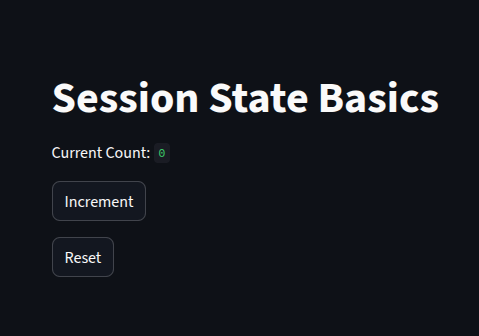
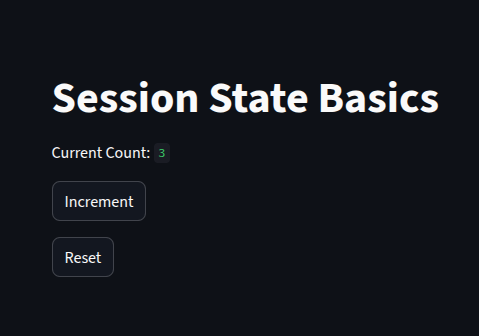
Accession Session State
we have two main ways of accessing session state
Dictionary-like syntax
Attribute-style access
#Dictionary-like syntax
st.session_state["name"] = "Alice"
st.write(st.session_state["name"])

#Attribute-style access
st.session_state.name = "Alice"
st.write(st.session_state.name)

Widget + Session State Binding
Each widget can be tied to a session state variable using the “key” parameter
location = st.text_input("Enter your location", key="userlocation")
st.write("welcome to", st.session_userlocation)

Callbacks with Session State
widgets can trigger callbacks on value change
callback functions are functions used in another functions
callback fires when value changes
def handle_change():
st.write("you typed:", st.session_state.user_input)
st.text_input("Type something", key="user_input", on_change=handle_change)

Counter App using Session State
if "counter" not in st.session_state:
st.session_state.counter = 0
if st.button("Add 1"):
st.session_state.counter += 1
st.write("Counter:", st.session_state.counter)

Login Form
with st.form("Login"):
username = st.text_input("Username", key="user")
password = st.text_input("Password", type="password", key="pwd")
submit = st.form_submit_button("Login")
if submit:
if username == "admin" and password == "1234":
st.session_state.logged_in = True
st.success("Welcome, Admin")
else:
st.error("Invalid credentials!")
if "logged_in" in st.session_state and st.session_state.logged_in:
st.write("You are logged in 🎉")


Multi-Page Navigation
if "page" not in st.session_state:
st.session_state.page = "Home"
if st.button("🏠 Home"):
st.session_state.page = "Home"
if st.button("📊 Dashboard"):
st.session_state.page = "Dashboard"
if st.session_state.page == "Home":
st.write("Welcome to Home Page")
elif st.session_state.page == "Dashboard":
st.write("Dashboard Content Here")

Search Filter with Memory
import pandas as pd
data = {"Name": ["Alice", "Bob", "Charlie", "David"], "Age": [25, 30, 35, 40]}
df = pd.DataFrame(data)
search = st.text_input("Search Name", key="search")
if st.session_state.search:
results = df[df["Name"].str.contains(st.session_state.search, case=False)]
st.write(results)
else:
st.write(df)
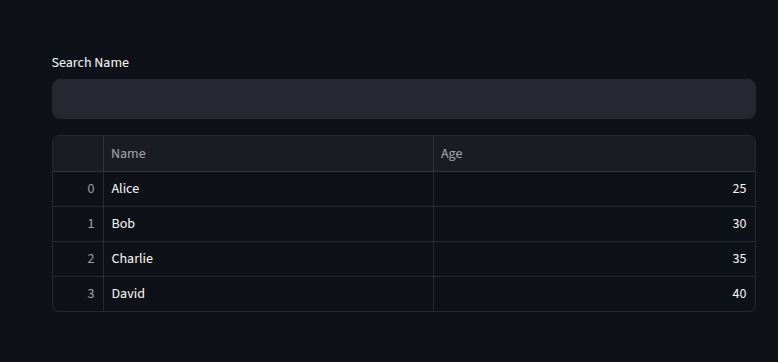
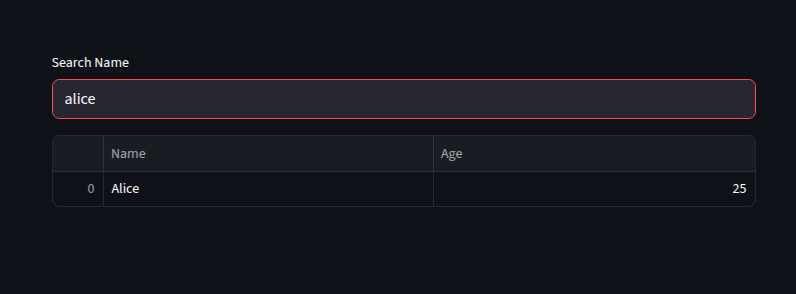
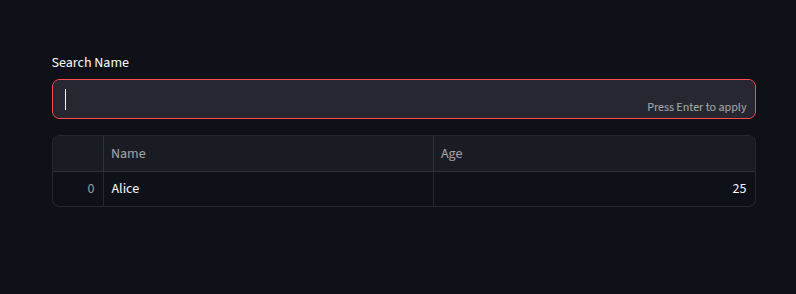
Best Practices
Always initialize session state variables before use.
Use descriptive
keynames for widgets.Group related variables in dict-like structures inside
session_state.Avoid overusing session state for large datasets → use
st.cache_datainstead.Don’t store sensitive data (e.g., plain-text passwords).
Want to learn more about Streamlit?: Click Here
Watch videos on Streamlit:
